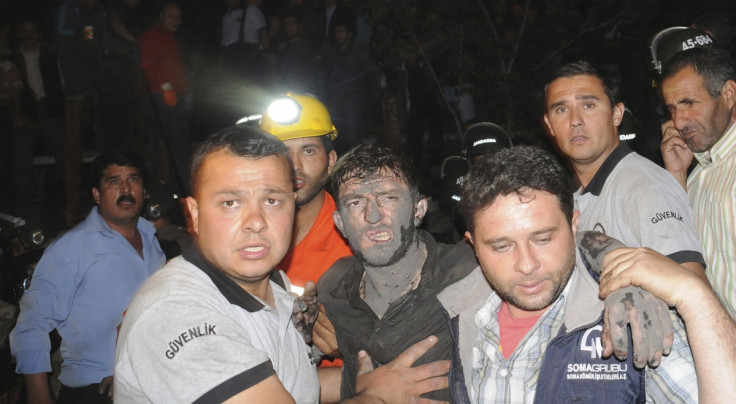Turkey's Sorry History of Coal Mining Disasters

- Turkey Coal Mine Disaster: Angry Protesters Vent Fury on Erdogan and Mine Owner
As the death toll from Turkey's Soma coal mine explosion continues to rise, energy minister Taner Yildiz said that it is likely to be "the country's deadliest accident ever".
But coal mining accidents are not unusual in a country which, in recent years, has put a concerted effort into expanding the sector.
The government, however, has come across as unfortunately ambivalent in its response to such incidents.
The general Mine Workers Union in Turkey reports that between 2000 and 2009, there were 25,655 accidents in the mines of the state-owned Turkish Coal Corporation (TTK), injuring 26,324, with 63 miners losing their lives.
While this latest incident was on the property of the privately-owned Soma Kömür İşletmeleri, it reflects a wider problem in mine safety that's systemic to Turkey's industry.
Safety Records
In May 2010, the Zonguldak mine disaster killed 30 people in the Karadon coal mine, owned by the TKK. In February 2010, 13 miners died in an explosion in Balikesir Province.
In December 2009, 19 miners died in a methane gas explosion in Bursa Province.
When Turkish Prime Minister Recep Tayyip Erdoğan visited the Zonguldak site, he said such accidents "are the fate of the profession" and that the "people of the region are used to incidents like this".
In 2008 and 2009 135 miners died in accidents, according to the Chamber of Mining Engineers of Turkey.
More than 200 miners have thus far been reported dead in the Soma disaster, meaning it's certainly the biggest mining accident since a firedamp explosion killed 270 miners in 1992 (again in Zonguldak), but to imply that this is an isolated incident is wrong.
Turkish miners have been vocal in their criticism of safety standards in Turkey's mining sector. One survivor this morning described the latest victims as "lambs to the slaughter".
In November 2013, 300 miners barricaded themselves in a Zonguldak mine in protest at working conditions.
After the Balikesir accident in 2010, the president of the Turkey Revolutionary Mine Search and Processing Workers Trade Union said that there were problems in multiple areas including: a lack of air ventilation, deficient early warning system and a lack of mine auditing.
Furthermore, he accused the Ministry of Labour of carrying out any audits it conducts from Ankara, rather than on the site of the mine.
Asli Odman of Istanbul's Mimar Sinan Fine Arts University told BBC Radio 4's Today programme this morning that "privately-owned mines in Turkey have 'really cut down' occupational hazard budgets in recent times".
Turkey's Energy Markets
Turkey still generates one quarter of its electricity through coal-fired plants, so much of the coal mined in the country is used for domestic consumption.
It is the seventh-largest importer of coal in the world, as well as being the 13<sup>th largest producer.
In 2012, the government dropped incentives for building gas-fired plants in place of incentivising those for coal-fired plants. Part of the reason is to protect the economy against fluctuations in the gas industry. It has been hit in the past by the international sanctions placed on Iran, from which it sources a majority of its gas imports.
Cagatay Bircan, a Turkey analyst at the European Bank for Reconstruction and Development, said that the steel sector and iron ore production are more important to Turkey's economy.
Turkey exports 6.7% of the world's finished steel products, but accidents are much less prevalent in this industry.
Bircan suggests that this is because the facilities used in iron ore mining and steel production are newer and have been upgraded to meet modern standards.
This is clearly something that has not happened in the coal industry, nor does it seem to have been a major concern for Erdoğan's government.
© Copyright IBTimes 2025. All rights reserved.






















